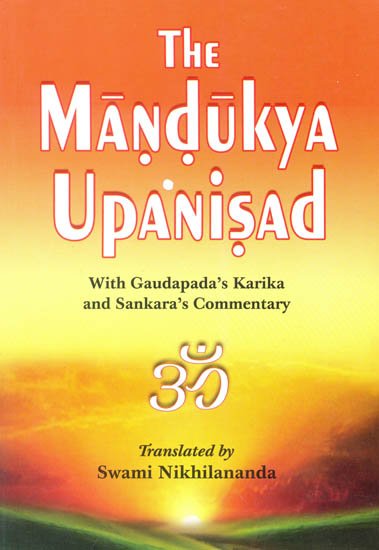Mandukya Upanishad (Gaudapa Karika and Shankara Bhashya)
by Swami Nikhilananda | 1949 | 115,575 words | ISBN-13: 9788175050228
This is verse 3.1 of the Mandukya Karika English translation, including commentaries by Gaudapada (Karika), Shankara (Bhashya) and a glossary by Anandagiri (Tika). Alternate transliteration: Māṇḍūkya-upaniṣad 3.1, Gauḍapāda Kārikā, Śaṅkara Bhāṣya, Ānandagiri Ṭīkā.
Mandukya Karika, verse 3.1
Sanskrit text, IAST transliteration and English translation
उपासनाश्रितो धर्मो जाते ब्रह्मणि वर्तते ।
प्रागुत्पत्तेरजं सर्वं तेनासौ कृपणः स्मृतः ॥ १ ॥upāsanāśrito dharmo jāte brahmaṇi vartate |
prāgutpatterajaṃ sarvaṃ tenāsau kṛpaṇaḥ smṛtaḥ || 1 ||1. The Jīva betaking itself to devotion (upāsanā) thinks itself to be related to the Brahman that is supposed to have manifested Himself He is said to be of narrow intellect because he thinks that before creation all was of the nature of the unborn (Reality).
Shankara Bhashya (commentary)
While determining the meaning of Aum, it has been stated in the form of a proposition that “Ātman is the negation of phenomena, blissful and non-dual.” It has been further stated that “Duality does not exist when the reality is known.” Further, in the chapter on Illusion, that duality does not exist really has been established by the illustrations of dream, magic, castle-in-the-air, etc., and also by reasoning on the grounds of “the capability of being seen” and “the being finite,” etc. Now it is asked whether non-duality can be established only by scriptural evidence or whether it can be proved by reasoning as well. It is said in reply that it is possible to establish non-duality by reasoning1 as well. How is it possible? This is shown in this chapter on Advaita. It has been demonstrated in the last chapter that the entire realm of dualism including the object and the act of devotion is illusory,2 and the attributeless, non-dual Ātman alone is the Reality. The word “upāsanāŚrīta” in the text, meaning the one3 betaking himself to devotion, signifies him who has recourse to devotional exercises as means to the attainment of liberation and who further thinks that he is the devotee and Brahman is his object of worship. This Jīva or the embodied being further thinks that through devotional practices he, at present related to the evolved4 Brahman (Personal God), would attain to the ultimate Brahman after the dissolution of the body. Prior5 to the manifestation, according to this Jīva, everything including itself, was unborn. In other words he thinks, “I shall, through devotional practices, regain that which was my real nature before manifestation, though at present I subsist in the Brahman that appears in the form of the manifold.” Such a Jīva, that is, the aspirant, betaking itself to devotion, inasmuch as it knows only a partial aspect of Brahman, is called of narrow6 or poor intellect by those who regard Brahman as eternal7 and unchanging. The Upaniṣad of the Talavakāra (Kena) supports this view in such statements as, “That which is not expressed (indicated) by speech and by which speech is expressed, That alone know as Brahman and not that which people here adore,” etc.
Anandagiri Tika (glossary)
1 Reasoning—The truth arrived at by reasoning may be corroborated by one’s own experience and further supported by the Śruti.
2 Illusory—It is because these belong to the realm of duality.
3 One, etc.—One who does not know the eternal and unchanging nature of the Self, thinks of himself as separate or different from his real nature and has recourse to various spiritual practices in order to regain his Brahmic nature, which he thinks he does, after death. Compare the Christian view of the “Fall of man”. These views are given in the Hindu scriptures also but refuted at the end from the standpoint of Truth, which is that even when a man thinks himself to be ignorant and tries to attain Knowledge by means of spiritual practices, he is Brahman. The nature of the non-dual Brahman never undergoes any change or transformation. There is no act of creation.
4 Evolved Brahman—The Jīva in his state of imaginary “fall” worships a Personal God or a Cosmic Soul. He cannot think of the non-dual Self; but he imagines the Saguṇa Brahman to be Reality.
5 Prior—This ignorant Jīva thinks that only after death he will realise his eternal Brahmic nature, which was his real nature before he came into dual existence.
6 Narrow—It is because an ignorant person has no idea of the changeless non-dual Self. For, according to his view the non-dual Self is also limited by time and change which characterise the dual universe.
7 Eternal, etc.—According to the Knower of Truth, Brahman never undergoes any manifestation. The phenomena of birth and death are mere illusion.
